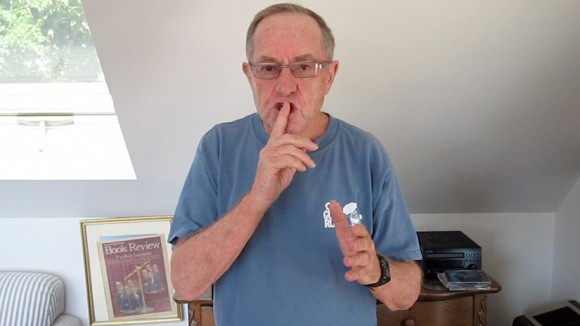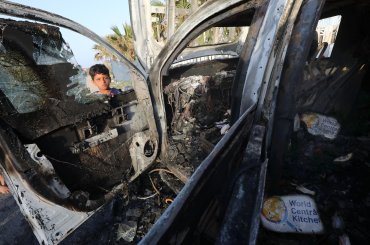You might have assumed that those within the Harvard community who disagreed with the Harvard Crimson’s editorial endorsing nonviolent BDS would be measured and reasonable in their reactions. After all, Harvard is a university where calm intellectual inquiry is supposed to reign.
You would have been wrong. The Harvard Crimson’s original editorial was a model of polite reason. But some of the responses were anything but. Harvard’s former president, Larry Summers, said the editorial endorsed positions that “were basically antisemitic, immoral, poorly thought out.” Alan Dershowitz, once a respected professor at Harvard Law School, agreed that the editorial was “anti-Semitic,” and that “the megaphone of the Crimson will increase the high rate of anti-Semitism on campuses.”
Let’s pause to reflect about how a group of undergraduates would feel on being told by distinguished members of their community not that they were wrong, but that they were “anti-Semitic.”
I decided on an experiment. I sent the Crimson editorial to Larry Derfner, long a prominent journalist in Israel, who is presently an editor at the respected daily Haaretz. He responded: “About the editorial, I might quibble with a sentence or two, but to say it’s anti-Semitic is a malicious lie. And most Haaretz journalists would agree that it’s not anti-Semitic.”
It’s not that most Israelis would agree with Larry Derfner’s overall views, (or, for that matter, with Haaretz’s editorials). But it is true that a significant portion of the Israeli public would take the Crimson editorial seriously, and try to rebut it on the facts instead of slandering the young people who wrote it.
Summers, Dershowitz and the others should order a copy of Derfner’s compelling 2017 memoir, No Country for Jewish Liberals, to start to understand what Israel is actually like today. Derfner was raised in Los Angeles, moved to Israel in 1985, and continued on to a distinguished career in journalism there, including as a columnist at the Jerusalem Post. As I noted when his book appeared, “No liberal Zionist who reads this 260-page, sprightly-written book will be able to close it with their complacency intact.”
Next, Summers and Dershowitz should look into Professor Jerome Slater’s brilliant Mythologies Without End: The US, Israel, and the Arab-Israeli Conflict 1917-2020. Slater is in his mid-80s, and he produced the work of a lifetime. He is Jewish, and he once enthusiastically supported Israel, but then he changed. He’s a skilled writer, and so his 495-page book is still a page-turner despite its length. When it appeared I wrote: Slater “has made an extraordinary contribution to the global movement for justice in Israel, Palestine, and the Mideast generally,” and that his book is “a readable and encyclopedic work that will be invaluable for years to come.”
Ex-Harvard president Summers and former law professor Dershowitz should pay particular attention to Slater’s closing sentence:
If there is ever to be an at least minimally just solution to the Israeli-Palestinian conflict, whether it takes the form of some kind of two-state settlement or a binational democratic state, the most important prerequisite, indeed the sine qua non, must be an Israeli recognition that their historical narrative of the conflict is largely mythological and that they have incurred an overwhelming moral obligation and an enlightened self-interest to reach a peace settlement with the Palestinian people.



“Alan Dershowitz, once a respected professor at Harvard Law School” — yes, “once” is the operative word. As for Larry Summers, I’m glad he’s back at Harvard. He can do less harm there than he could in Washington.
Thanks to Mondoweiss for bringing the Crimson editorial to my attention. I tried to get on the Crimson website to comment, but (a) it was packed with mostly hostile comments and (b) I couldn’t figure out how to get on. So I wrote them a letter. On paper. I said it was an old technology, more suited to my vintage. I put it in the mail at a Harvard reunion last weekend.
When I was an undergraduate, someone asked me if Harvard still had a Jewish quota. I said, “Thirty per cent?” I think the student body was actually about 10% Jewish. (And in those days, almost all white. Not any more!)
1 of 2
https://english.alahednews.com.lb/65244/389
Alahed News, May 2/22
[Al-Awda-News] Fw: “Nearly Half of ‘Israeli’ Youths Pessimistic about ’Israel’s’ Future, 33% Think of Leaving” “A new survey of young Zionist occupiers found that nearly half of the population in the occupied territories is not optimistic about the future of the ‘Israeli’ entity, while more than one-third of people are thinking about immigration to find jobs & improve their lives.
“The poll was conducted by the ‘Israeli’ Fenima research center as part of an investigation to find a solution to reduce social fragmentation within Zionist society.
“The research center described its findings, which were published by the Hebrew-language ‘Israel’ Hayom daily newspaper on Sunday, as ‘worrying’ & wrote that 33% of ‘Israeli’ youths are considering emigration from the occupied lands. Also, 44% of them feel there is no future for the regime.
“Issues such as rising living costs, security situation & social divisions are among other reasons for young ‘Israeli’ adults to mull over leaving the occupied territories.
“The poll highlighted that 40% of the respondents have cited rising costs for such a potential decision, while 22% of those asked have blamed poor security situation.
“Social divisions have been described as the main immigration reason for 18% of those surveyed.
“Many scholars & writers have already pointed to the theory of ‘Collapse from Within’ regarding the future of ‘Israel,’ considering the three factors of economic crisis, poor security situation & social divisions.
There has been intense public anger in recent months in the ‘Israeli’-occupied territories over rising costs, after the price of both gasoline & electricity, as well as basic goods, went up.
“According to the Economist Intelligence Unit’s [EIU] Worldwide Cost of Living index, the coastal city of Tel Aviv is ranked the most expensive city in the world.
“Tel Aviv rose to the top spot from fifth place last year, beating out Paris & Singapore, which were tied for second place. Its move up the ladder is partly due to the increases in transport & grocery prices.” (cont’d)
.
2 of 2
“Property prices in Tel Aviv have also risen, particularly in residential areas, although they are not considered part of the index, added the EIU.
“Earlier this year, thousands of Zionist occupiers held a mass demonstration in Tel Aviv to voice their resentment against the soaring cost of living in the city, which is estimated to have become the most expensive metropolis in the world to live in.”